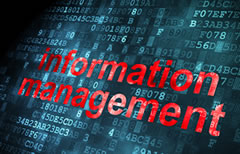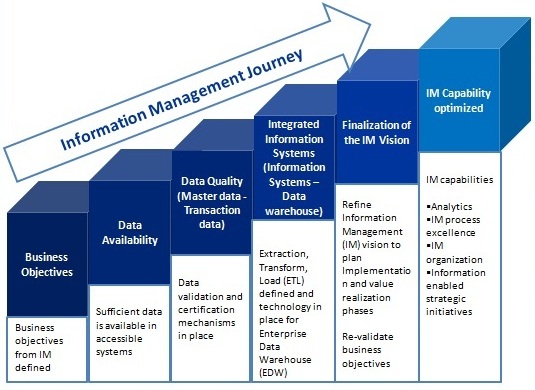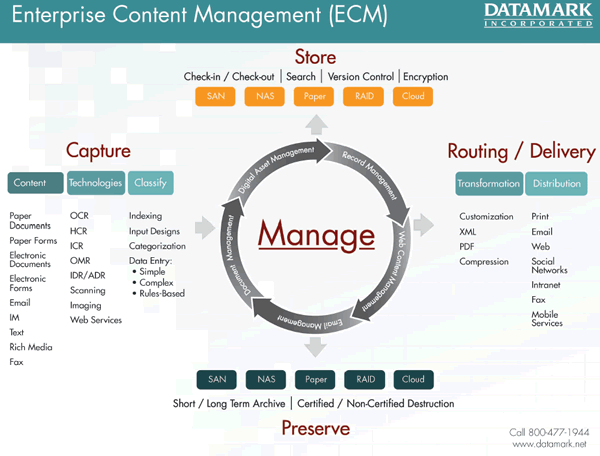 What’s the difference between Enterprise Content Management and Information Management?
What’s the difference between Enterprise Content Management and Information Management?
The information management space is pretty terminology-intensive. How else could it be? After all, descriptions and metadata are almost part of the DNA of anyone dealing with data and information. There are many definitions of both terms. And thus there is no universal information management definition nor enterprise content management definition, which of course can lead to confusion.
A matter of perspective: an information management definition in evolution
In practice you’ll sometimes see that Enterprise Content Management (ECM) and information management are used interchangeably. However, there are differences. ECM – today – is seen as a core element of information management AND of Enterprise Information Management (EIM).
Although there are associations and industry bodies (and a huge list of literature) trying to define the various terms and best practices, what terms get used when is also a matter of who uses them. Vendors of information management systems and ECM platforms tend to have their own terminology and people with a history in data management tend to talk about things differently than those who started getting active in content management and ECM when Web Content Management systems and practices became popular.
The meaning of the term information management has also been evolving over the years (it’s certainly not what it was back in the nineties anymore in this age of information ubiquity and diversity) and so has the information management definition with the more recent and still relatively new competency of Enterprise Information Management (so: not the same as information management). The same has happened with the term enterprise content management (ECM): it changed since the early days.
Information management: close to business management and management principles
In general, information management (IM) and Enterprise Information Management (EIM) have a broader meaning than Enterprise Content Management. However, ECM itself is also an umbrella term.
Information management is about the management (in all senses of the word, so including applying principles of management and looking at the challenges to address) of information assets and the principles of turning data into information into knowledge into action and value (an ongoing challenge as few organizations can really extract full value of their information). Outcomes, value, principles of management, information assets: it’s clear that information management is not just about technologies or tools, well on the contrary.
Information management also includes data management and all data-related activities (analysis, master data management or MDM) which you typically won’t find in the job profile of someone who is responsible for Enterprise Content Management. The principles revolve around people, processes and tools/technologies across a variety of activities, from input to governance and architecture to business processes, leading to outcomes. Enterprise Content Management is a subset (and key component) of information management, just like data management and information governance. ECM also focuses on unstructured content.
The management part of information management also brings the information manager closer to business management as it’s a highly strategic function. It’s about realizing benefits and solving challenges. Just compare with how in IT (information technology, again something else) there is a shifting focus on the business equation (with an evolving role of the CIO) and on the strategic and business role of the ‘i’ (information) in IT.

Enterprise Content Management: part of information management
Enterprise Content Management overlaps with the information management definition and practice in the sense that both look at what happens with the data, documents, information and content in areas such as input (capture), governance and retrieval, to name a few (again, ECM is about unstructured content).
You’ll notice it in all information management definitions and attempts to define ECM. However, ECM always had a more technological focus (even if it requires strategy) and looked at the enterprise content and its relationship with the process: from document capture and governance to storage, delivery and presentation (for instance on a website or fed into a back-office system such as the Enterprise Content Management System). This also used to be on a more departmental level and rather isolated way.
Enterprise Content Management is more about the management of the lifecycle of unstructured content (although the information lifecycle matters in IM too – information lifecycle management) and one way of approaching information management, while being part of it. What you’ll also find is that, among others due to the rapid evolutions in the volumes, variety and nature of information carriers and data, content management is decreasingly used and more reserved to the world of ECM systems with the mechanisms that feed content into systems (document capture, input) and ways to store, retrieve and present it.
ECM today really is a mix and evolution of various ways of handling mainly digital content, completed with more recent forms of unstructured content. One of these ways was indeed Web Content Management (WCM), which is still an important part of ECM systems. Other ways to handle digital content include(d) document management.
Information management on the rise, ECM on the decline
Since the popularity of Enterprise Content Management and Web Content Management around the end of the nineties the usage of the term has declined steadily as you can see above whereas the use of the term information management declined as well but then stabilized a bit and probably will continue to or even grow again since, as mentioned before, information management has a ‘new’ meaning and growing importance in this day and age where information management excellence is what makes the difference between a business that fails and one that succeeds.
Another telling sign of that evolution is how one of the several organizations in the space, AIIM, evolved. On our overview page of information management we put an image from AIIM showing what the association understands as information management. That image is based upon an older one (AIIM comes from an ECM background) which was called the ECM roadmap and was made approximately a decade ago. In fact, in those days AIIM called itself the Enterprise Content Management Association, whereas now it calls itself the global community of information professionals (AIIM’s information management definition is the same as Wikipedia’s as you can read on our information management overview page).

An information management definition: origins explaining definitions
T.D. Wilson PhD wrote an excellent introduction and overview of the original meaning and context of information management, whereby the roots of information management, data management and information technology are traced and explained and it has a good information management definition if you ask us.
It’s a dive back in time but the definition is still pretty accurate: “The application of management principles to the acquisition, organization, control, dissemination and use of information relevant to the effective operation of organizations of all kinds…Information management deals with the value, quality, ownership, use and security of information in the context of organizational performance“.
Value, management and organizational performance are keywords here and it’s in the sense of customer and business value (the outcomes) through applying management principles to information and processes in a context of business optimization, innovation, competitive benefits, performance and growth that we use the term information management today as well, even if the information space has changed, to say the least.
The five ECM areas as defined by AIIM
AIIM identified five areas in Enterprise Content Management since long before topics such as social data and big data (and many other evolutions in information) became popular: capture, manage, store, preserve and deliver. There are many graphical representations of this. In its definition of ECM as the strategies, technologies, tools and methods used to achieve each of the five tasks, the organization used “to emphasize that this content is related to and used by organizational processes, rather than simply content for its own sake”. ECM was/is seen as both a strategic approach to handle enterprise content as the software needed to do this across the five areas.
Top image purchased under license from Shutterstock
Originally posted on InformationDynamix

